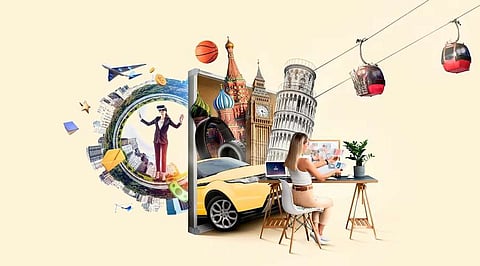

Although it may feel like you are "just using the internet" at this point, the internet has advanced significantly since its origin, and its effects on the travel industry have also.
What exactly does the term "Web3" mean? We wish to dispel the mystery. What effects have internet technology advancements had on the travel sector? And finally, how can businesses in the travel industry profit from upcoming innovations?
The travel business was in a completely different position at the turn of the millennium if we remember back to that time. Travelers had two options for making travel arrangements: either they visited their neighborhood travel agency for additional information and made a reservation, or the more daring ones bought a guidebook, spent several hours studying, and then made their arrangements independently. Fast forward to the present day, and as we are all aware, traveler booking practices could not be more dissimilar.
When we examine the options provided to clients online by critical participants in the travel sector like Booking.com, Airbnb, Skyscanner, and numerous more travel providers, we can observe these myriad variances. They merely seem unending. Additionally, there have been enormous advancements in the travel industry businesses.
The World Wide Web first provided users with unrestricted access to information. Web1 refers to the very first internet pages, which were text and data collections from the 1990s that were published online and made available to anyone who would be interested. These early pages were built on HTML but appeared to have no formatting at all.
Future fantasies include commenting capabilities, internet shopping, personalization, etc. Web1 is referred to as the "read-only" web because of this. Users could only read the information.
Regarding travel, this early iteration of the Internet gave people quick and simple access to specifics about their intended locations, including information on accommodations, customs, and flights. However, because of the limitations of Web1, users could not yet engage with the data or utilize it effectively themselves.
Users might only access information on Web1. Early in the new millennium, Web2 evolved into a more "participatory web."
Users have grown accustomed to personalized content and being able to actively participate with the internet to generate their content thanks to the emergence of social networks like Facebook, Instagram, and Twitter.
Travel 2.0 is the result of the Web2 and travel sectors coming together. Online reservations, review sites like Tripadvisor, and many more new business models have evolved, drastically reshaping the industry.
Web2 has brought about a lot of good, but Travel 2.0 has also caused major disruption in the travel industry for those businesses and subsectors that did not adopt these new web-based business models.
Two well-known instances are the failure of neighborhood travel agencies and the rise of platforms like Airbnb. In 2018, 82% of travel arrangements included no human involvement and were made online through a mobile app or website. Of the $1.2 trillion in revenue earned by the travel sector in 2019, 63% came from internet travel booking. This is significant, and there is no denying Web2's influence on the tourism sector.
And businesses that believed they were exempt from adopting these digital trends have suffered considerably.
Presently, the same is taking place.
What will Web3 be about? Web1 was all about consuming information, and Web2 was all about co-creation, especially user-generated content.
We must separate ourselves from the perception of the internet we currently use to comprehend Web3. Compared to the movement from Web1 to Web2, the move to Web3 offers even more opportunities, innovation, and change.
This is so because Web3 is built on the fundamental ideas of decentralization, openness, and data security, and offers numerous additional advantages to consumers, all made possible by blockchain technology. Ownership is another trait on which Web3 is built. Digital assets are authentically and legally assigned to internet users through Non-Fungible Tokens (NFTs) and smart contracts, making them marketable through proof of ownership and transferability. As a result, Web3 may be much more disruptive and cause a greater paradigm shift than Web2.
To be more precise, Web3 seeks to develop open, more interconnected, smarter decentralized applications where users may control their data by utilizing artificial intelligence, machine learning, and blockchain technology.
The travel sector will adopt a whole new structure and technology thanks to Web3, which will open up countless potential for brand-new goods and services.
We have yet to fully explore the possibilities that Web3 will present, but businesses in the travel industry need to be aware that a significant transition is currently taking place. It is essential to actively influence this new way of thinking in the sector if you want to remain relevant in the market.
Join our WhatsApp Channel to get the latest news, exclusives and videos on WhatsApp
_____________
Disclaimer: Analytics Insight does not provide financial advice or guidance. Also note that the cryptocurrencies mentioned/listed on the website could potentially be scams, i.e. designed to induce you to invest financial resources that may be lost forever and not be recoverable once investments are made. You are responsible for conducting your own research (DYOR) before making any investments. Read more here.
